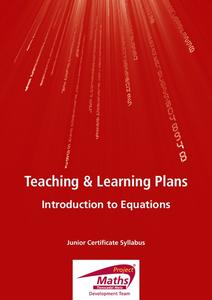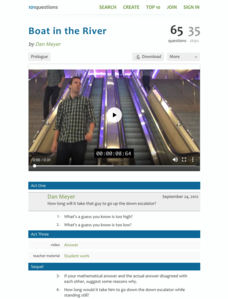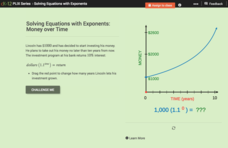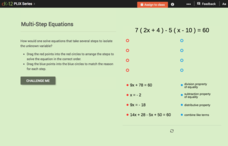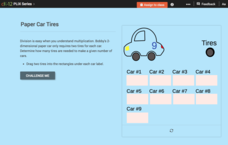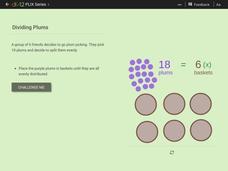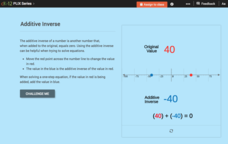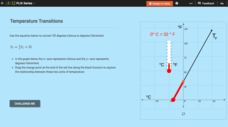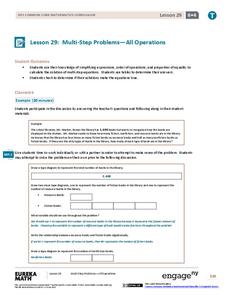Project Maths
Introduction to Equations
Do your pupils truly understand inverse operations, or is their understanding a little backward? Scholars learn the meaning of an equation in the second instructional activity of a four-part Algebra series. A series of activities...
101 Questions
Boat in the River
Ever feel like you're headed up the down escalator? Don't let your pupils get stuck in that rut! Practice writing equations to solve a problem using an engaging lesson. A video presents information that allows learners to determine how...
101 Questions
Nana's Paint Mixup
You would probably do anything for your Nana, including fixing her mistakes! Nana provided the wrong ratio to mix red and white paint, and she didn't realize it until after she mixed the paint. Your class now needs to figure out how to...
Kenan Fellows
Introduction to a Flight Computer
Keep your hands on the wheel—at all times! Scholars learn why pilots use a flight computer through a high-flying demonstration. Making calculations for speed, distance, or time is automatic if you know how to use a flight computer.
Alabama Learning Exchange
Solving Formulas for the Given Variable
Recycle, reuse, and rearrange! Young scholars learn to rearrange formulas to highlight a variable of interest. They then use their new formulas to make calculations.
Alabama Learning Exchange
Can You Solve the Mystery of the Variable?
Solving a murder is like isolating a variable. Using a video on a murder mystery, the narrator introduces the idea of solving a literal equation for one variable. After solving several equations, the class comes up with a set of...
Shodor Education Foundation
Equation Solver
Solve your equation and prove it, too. Young mathematicians solve linear equations using an interactive. They must input a property to justify each step of their solutions.
Shodor Education Foundation
Algebra Quiz
Reviewing the process of solving equations is as easy as one click of a button. Scholars solve linear and quadratic equations by using a helpful interactive. The computer app automatically scores responses, providing immediate feedback...
Shodor Education Foundation
Algebra Four
Everybody wins when you play Algebra Four. Players solve linear and quadratic equations to earn pieces on the Algebra Four game. Make a row of four pieces and you win the game. But everyone gets practice with solving equations, so really...
CK-12 Foundation
Solving Logarithmic Equations
Pupils follow a chain of reasoning in deconstructing a logarithmic equation step by step. Using their knowledge of logarithms, learners compare the solutions of logarithmic equations when the bases are changed.
CK-12 Foundation
Solving Equations with Exponents: Money Over Time
We'd all like to see our money double. An interactive shows how an initial investment of $1,000 will increase using a constant rate of return. Scholars answer a set of challenge questions based on the situation.
CK-12 Foundation
Multi-Step Equations
It's important to know why each step in solving an equation works. Scholars order the steps and reasons when solving a multi-step equation. Solutions require using the distributive property, combining like terms, and using properties of...
CK-12 Foundation
Single Variable Division Equations: Paper Car Tires
Don't tire of solving equations, mix up your lesson! A virtual interactive has users drag paper tires to toy cars. Solving a one-step equation lets them find how many cars can be made from a given number of tires.
CK-12 Foundation
One-Step Equations Transformed by Multiplication/Division: Dividing Plums
Be sure to use this plum resource. Scholars apply an interactive to find the number of plums each friend receives after plum-picking. They see how the interactive relates to one-step equations.
CK-12 Foundation
Multi-Step Equations with Like Terms: Shipments
Who doesn't like boxes of money? A drag-and-drop interactive lets users separate variables and constants to combine like terms. They answer a set of challenge questions based on the results of the interactive.
CK-12 Foundation
Two-Step Equations with Subtraction and Multiplication: Cupcake Equation
Solving equations is a piece of cake. Young mathematicians use an interactive to create a bar model to representing a situation involving cupcakes. They use the model to solve for the cost of a cupcake.
CK-12 Foundation
Two-Step Equations with Addition and Multiplication: T-Shirt Equation
Interactive bar models make solving equations fairly easy. Scholars use an interactive to adjust a bar model representing an equation. This model helps solve the equation.
CK-12 Foundation
Equations with Variables on Both Sides: Rubber Ducky Math
Rubber ducky, you're the one ... to help solve equations. Young mathematicians use an interactive to set up a situation involving rubber ducks. This helps users visualize and solve an equation with variables on both sides.
CK-12 Foundation
Solving Real-World Problems Using Multi-Step Equations: Bowling Ball Delivery
How many bowling balls can a truck carry? A slider interactive changes the weight of boxes and the number of bowling balls per box. Investigating with this slider lets users find the maximum number of bowling balls.
CK-12 Foundation
One-Step Equations and Inverse Operations: Additive Inverse
Reinforce properties while solving equations. Learners often ignore properties even as they try to apply them. A well-designed lesson emphasizes the role of additive inverses when solving equations.
CK-12 Foundation
Linear Equations: Temperature Transitions
Explore linear conversions using an engaging interactive lesson. Learners drag a point on a graph to discover the equivalent degrees in Fahrenheit and Celsius. Embedded questions highlight key features such as slope and the...
CK-12 Foundation
Properties of Equality and Congruence: Justifying Algebraic Steps
No need to justify using this resource. Learners drag justifications for each step of solving an equation in an interactive. To see if they are correct, all they need to do is use a slider and the correct answers appear.
EngageNY
Find Solutions to Make Equations True
The truth is always best. Individuals continue to find values that make equations true in the 26th installment of the 36-part module. The only difference is that they now call them solutions to those equations.
EngageNY
Multi-Step Problems—All Operations
Harness the power of algebra to solve problems. Young mathematicians learn to work out multi-step problems by applying algebraic techniques, such as solving equations and proportions. They use tape diagrams to model the problem to finish...


